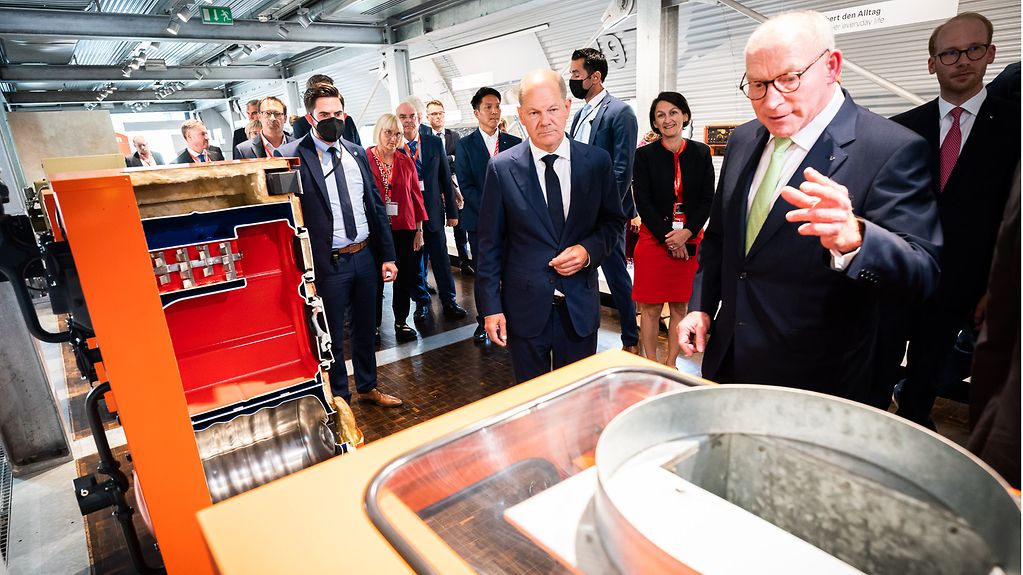The heating transition
Domestic living spaces need to become more efficient in order to save more energy. Energy-efficient redevelopment and new heating technologies will help to achieve this. To gain an insight into these technologies, Federal Chancellor Scholz visited the heat pump manufacturer Viessmann.
3 min reading time

Federal Chancellor Olaf Scholz visiting heat pump manufacturer Viessmann.
Photo: Federal Governement/Kugler
Advancing the energy transition in order to reduce dependence on coal, oil, and gas is one of the Federal Government's top priorities. "In order to ensure an independent and sustainable energy supply in Germany, we are forging ahead with cutting-edge technologies such as hydrogen and heating," said Federal Chancellor Olaf Scholz during his visit to the family-owned company Viessmann in Allendorf this Tuesday.
Heat pumps, such as those manufactured by Viessmann, which extract energy from the air or the ground and then reuse it to heat buildings, can harness environmental heat extremely efficiently for domestic heating purposes.
Working together to bring about the energy transition
Germany has set a target of achieving climate neutrality by 2045, whereby one of the most important challenges is to avoid greenhouse gas emissions from heat production in the building sector. "We have to succeed in that endeavour for the sake of the climate," said Federal Chancellor Scholz, adding that the same applied to our own economic prosperity.
"What we are also finding out is that things that are important for our economic prosperity as well as for protecting the environment and the climate are also things that can help to keep life affordable," the Federal Chancellor continued, adding that one thing was clear: the continued use of fossil resources would cost more and more.
More financial support for energy-efficient redevelopment
The Federal Government provides substantial funding for homeowners to facilitate the renovation of their homes and to help them save energy. The Federal Government aims to clear the way for more renovation with its reform of the federal funding for efficient buildings programme, which is now clearer and more straightforward to apply for through the KfW (a German state-owned investment and development bank) as of 28 July 2022. The specific objective is to redevelop old houses and flats in order to save energy.
Some 13 to 14 billion euros will be made available over the next few years to subsidise energy-efficient buildings, the majority of which will be reserved for redevelopments with only one billion euros earmarked for new buildings. Around 9.6 billion euros have already been spent on redevelopment funding between January and July 2022.
Improving security and sustainability
"If we can use less of these resources by replacing them with renewable energy sources, which we are expanding on a huge scale, while at the same time using modern technologies, this will also enhance our security and our future viability as a country,” said the Federal Chancellor, referring to the entrepreneurial achievements within the heating industry and the skilled trades.
A heat pump summit, said Scholz, which was hosted by Robert Habeck, Federal Minister for Economic Affairs and Climate Action and Klara Geywitz, Minister for Housing, Urban Development and Building, had also recently taken place to kick off a comprehensive dialogue with all stakeholders. The event was attended by a total of 26 representatives of heating sector companies and associations, the skilled trades, trade unions, and consumer protection organisations.
500,000 new heat pumps as of 2024
The alliance put out a strong message by declaring its intention to install 500,000 new heat pumps per year starting in 2024. A further requirement as of January 2024 will be that, as far as possible, every newly installed heating system should be powered by 65 percent renewable energy sources. As Habeck emphasised after the summit: "This also highlights the fact that we will need more heat pumps in very short order, and this is exactly what we are now tackling together."
The Federal Ministry of Economics and Climate Protection (BMWK) and the Federal Ministry for Housing, Urban Development and Building (BMWSB) had also presented an emergency programme for the building sector in mid-July 2022, he said, the aim of which was for the building sector to comply with the annual emission levels permitted under the Climate Protection Act going forward. One of the main goals is to achieve Germany's climate target of reducing greenhouse gas emissions by 65 percent by 2030 compared to 1990.